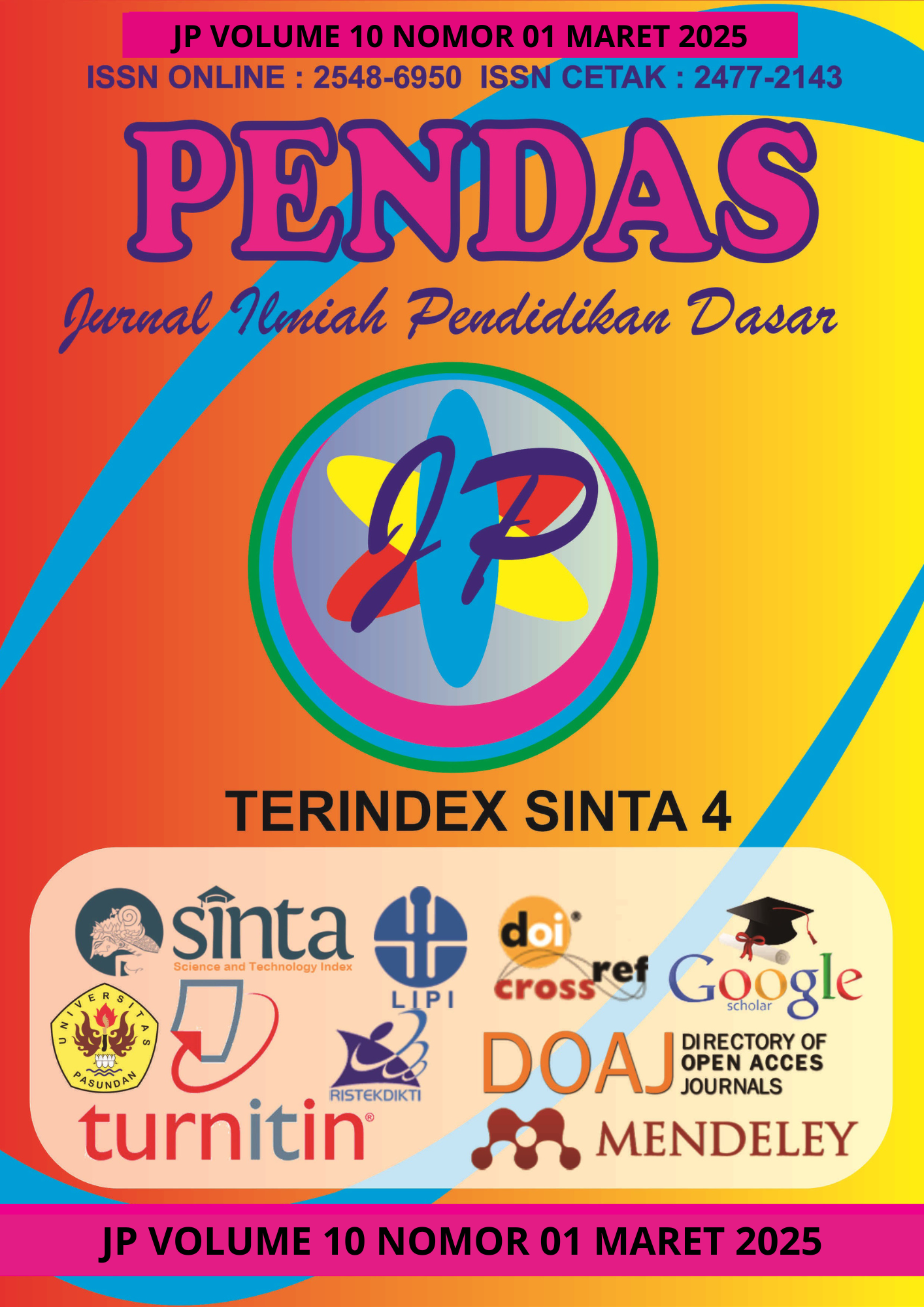PENGEMBANGAN BAHAN AJAR BERMUATAN LITERASI BERBASIS FIGMA PADA MATA PELAJARAN BAHASA INDONESIA KELAS IV SD NEGERI 104205 TEMBUNG
DOI:
https://doi.org/10.23969/jp.v10i01.23533Keywords:
Teaching Material, Literasi Digital, FigmaAbstract
This study aims to develop a product intended for use in the educational process and to evaluate the feasibility, practicality, and effectiveness of Figma-Based Literacy Teaching Materials in the Indonesian Language curriculum for fourth grade students at SD Negeri 104205 Tembung. The research employs a Research and Development (R&D) methodology, utilizing the ADDIE model, which encompasses five distinct phases: analysis, design, development, implementation, and evaluation. The subjects of this research are fourth-grade students utilizing the Figma-Based Literacy Teaching Materials within the Indonesian Language subject. Data collection instruments include observation, interviews, material validation questionnaires, media design validation questionnaires, educational practicality questionnaires, and assessment tests. The findings from the development of the Figma-based literacy teaching materials for the Indonesian Language subject indicate that the material validation received a percentage score of 88%, categorizing it as "Very Valid." Additionally, the validation conducted by media design experts yielded a score of 90.5%, also classified as "Very Valid," thereby confirming that the media is suitable for implementation in the educational process. In terms of practicality, feedback obtained from teachers through questionnaires resulted in a percentage score of 95%, categorized as "Very Practical." Effectiveness assessments, conducted via pretests and posttests, demonstrated an average N-gain of 66.9%, which is classified within the "effective" range.
Downloads
References
Arifin, M. R., Rahmadani, M. R. B., Faiz, M. F. A., Firmansyah, R. A., & Radianto, D. O. (2024). Pentingnya Penguasaan Bahasa Indonesia Dalam Menun Menunjang Pembangunan Sosial Ekonomi Negara. Jurnal Sains Student Research, 2(2), 125–131. https://doi.org/https://doi.org/10.61722/jssr.v2i2.1183
Aziz, E. A. (2022). Pedoman Model Revitalisasi Bahasa Daerah. Badan Pengembangan dan Pembinaan Bahasa.
Mubarok, M. I., Matin, R. A., Safaat, S., & Nurfitria. (2024). Metode Pembelajaran Bahasa Indonesia Di Sekolah Dasar. Journal of Educational and Language Research, 8721, 265–274.
Ali, M. (2020). Pembelajaran Bahasa Indonesia dan Sastra (BASASTRA) di Sekolah Dasar. PERNIK Jurnal PAUD, 3(1), 35–44.
Ernawati, N., & Rasna, I. (2020). Menumbuhkan Keterampilan Menyimak Peserta Didik dalam Pembelajaran Bahasa Indonesia. Jurnal Pendidikan Dan Pembelajaran Bahasa Indonesia, 9(2), 103–112.
Mutaqi, I., & Nurcahyaningtias, N. D. (2021). Peran Bahan Ajar Dalam Pembelajaran Bahasa Arab. Mahira: Journal Of Arabic Studies, 1(1), 69–77.
Kelana dan Pratama. 2019. Bahan Ajar IPA Berbasis Literasi Sains. Bandung: LEKKAS
Nugraha, D. (2022). Literasi Digital dan Pembelajaran Sastra Berpaut Literasi Digital di Tingkat Sekolah Dasar. Jurnal Basicedu, 6(6), 9230–9243. https://doi.org/10.31004/basicedu.v6i6.3318
Shafa, Z., Supiani, T., & Hidayah, N. (2023). Pengembangan E-Modul Berbasis Figma pada Pembelajaran Tata Rias Karakter Horor. Journal of Comprehensive Science (JCS), 2(1), 292–305. https://doi.org/10.59188/jcs.v2i1.207
Sugihartini, N., & Yudiana, K. (2018). Addie Sebagai Model Pengembangan Media Instruksional Edukatif (Mie) Mata Kuliah Kurikulum Dan Pengajaran. Jurnal Pendidikan Teknologi Dan Kejuruan, 15(2), 277–286. https://doi.org/10.23887/jptk-undiksha.v15i2.14892
Sugiyono. Metode penelitian kuantitatif kualitatif dan R&D Bandung: Alfabeta (2021).
Sukarelawan, I., Indratno, T. K., & Ayu, S. M. (2024). N-Gain vs Stacking (1st ed.). Penerbit Suryacahya.
Riduwan. 2016. Dasar-dasar Statistika. Bandung: Alfabeta
Nabilla, N., Edy, S., & Khikmiyah, F. (2022). Pengembangan E-LKPD Matematika Interaktif Berbasis Literasi Digital. Jurnal Pembelajaran Matematika Inovatif, 5(6), 1581–1594. https://doi.org/10.22460/jpmi.v5i6.1581-1594
Wedastuti, N. K., Sunismi, & Fuady, A. (2023). Pengembangan E-Modul Berbasis Literasi Model Pisa. Jurnal Teknologi Pendidikan, 11(1), 459–471. https://doi.org/10.31800/jtp.kw.v11n1.p459--471
Hasyim, M. W., Astuty, I., & Enawaty, E. (2024). Pengembangan E-Modul Berbasis Literasi Digital Bahasa Arab Pada Materi Jam Kelas 8 Di Madrasah Tsanawiyah. Jurnal Teknologi Pendidikan (JTP), 17(1), 29–38. https://doi.org/10.24114/jtp.v17i1.57393
Downloads
Published
Issue
Section
License
Copyright (c) 2025 Pendas : Jurnal Ilmiah Pendidikan Dasar

This work is licensed under a Creative Commons Attribution 4.0 International License.














































